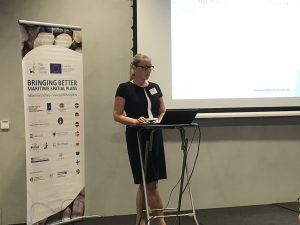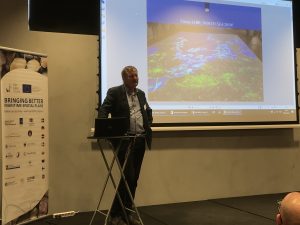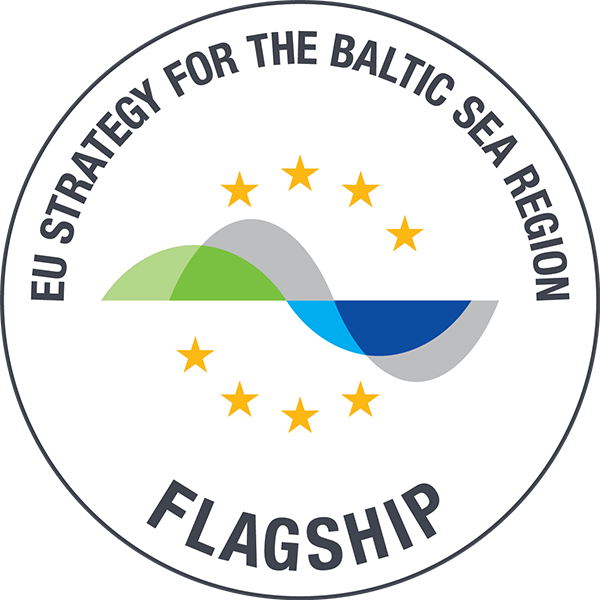Our Opening event took place on 20 June 2018 in Malmo, Sweden. We gathered nearly 100 participants to get to know the people and the project better as well as to continue the work we already started within several of our activities.
Relevant files:
- AGENDA of the event
- Participants list
- Master presentation
We started with the keynote speeches of Felix Leinemann, DG Mare, Head of Unit stressing that “Cross-border collaboration in MSP is a shared responsibility”.
Watch the short interview with Felix below.
Also Helen Ågren, Swedish Ministry of Foreign Affairs, Ambassador for the Ocean welcomed the participants stating that “The process is a goal in itself, the learning and planning process is important”.

Pan Baltic Scope was presented trying to explain our 12 activities gathered under the three big topics in an easy, a bit funny and simple way. So, together with our activity leaders, we entered the magic elevator that brought us to different destinations but at the end we all met at the same spot and concluded that we all aim at making our maritime spatial plans fit better to each other and make them more coherent.
Get an insight into what happened in the magic elevator.
#Elevatorpitch to explain what #PanBalticScope is all about. Awesome and concise way to deliver your message! @havochvatten pic.twitter.com/OZFYwRU5xm
— Jonas Pålsson (@Kelonia_se) June 20, 2018
Check also other posts from the event via #PanBalticScope
Our sister project SEANSE represented by Leo de Vrees from the Ministry Infrastructure and Water Management in the Netherlands also joined us to share the experience of the North Sea with the focus on the strategic environmental assessment.
Presentation:
SEANSE – Strategic Environmental Assessment North Sea Energy as an aid for MSP.

Our collaboration consists of different countries being at different stages of the maritime spatial planning. We gathered representatives from all partner countries involved in the project to share the status and the progress of the planning processes.
Presentations are available in the Master presentation.
The second part of the conference started with the workshops dealing with the issues of the project interest. There were three workshops held:
I Existing experience in mapping ecologically significant areas and way forward to harmonised Green Infrastructure concept in the Baltic Sea Region
Session leaders:
Jan Schmidtbauer Crona, Swedish Agency for Marine and Water Management
Anda Ruskule, Baltic Environmental Forum, Latvia
Presentations:
- Existing experiences in mapping ecologically significant areas and way forward to harmonised GI concept in the BSR
- Ecosystem based-approach toolbox and green infrastructure
- A way forward to GI planning in the BSR: aims and tasks of the PanBalticScope project
- Experience with mapping of GI/ecologically valuable areas in the BSR
- Swedish Green infrastructure mapping – a true story
- Questions for discussion and possible criteria for identification of biologically/ecologically valuable areas
II Exploring the depths and shallows of Land-Sea Interaction in MSP
Session leader:
Andrea Morf, NORDREGIO
Presenters and hosts: the case study team
Presentation:
Exploring the shallows and depths of Land-Sea Interaction in MSP
III Impacts on the environment and importance to society – including cumulative effect assessment and socioeconomic analyses in maritime spatial planning
Speakers:
Lena Bergström, HELCOM
Maija Holma, HELCOM
Stefano Menegon, ISMAR-CNR, Italy
Kari Hyytiäinen, University of Helsinki, Finland
Triin Lepland, Ministry of Finance, Estonia
Workshop report and presentations:
- Impacts on the environment and importance to society – cumulative effect assessment and socioeconomic analyses in maritime spatial planning
- Geospatial tools for addressing Cumulative Effects and Socio-Ecological analysis
- BONUS BALTICAPP: Wellbeing from the Baltic Sea – applications combining natural science and economics
- Economic model and cumulative impact online tool – supporting MSP
- DISCUSSIONS: Impacts on the environment and importance to society -cumulative effect assessment and socioeconomic analyses in maritime spatial planning

















